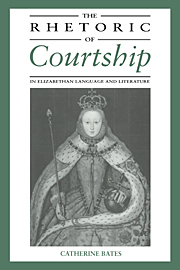Book contents
- Frontmatter
- Contents
- List of illustrations
- Acknowledgements
- Prologue
- 1 The rhetoric of courtship: an introduction
- 2 The semantics of courtship
- 3 Courtship at court: some pageants and entertainments at the court of Elizabeth I
- 4 ‘Courtly courtesies’: ambivalent courtships in Euphues, Euphues and his England, and the Arcadia
- 5 ‘Of Court it seemes, men Courtesie doe call’: the Amoretti, Epithalamion, and The Faerie Queene, book vi
- Epilogue
- Notes
- Bibliography
- Index
5 - ‘Of Court it seemes, men Courtesie doe call’: the Amoretti, Epithalamion, and The Faerie Queene, book vi
Published online by Cambridge University Press: 29 September 2009
- Frontmatter
- Contents
- List of illustrations
- Acknowledgements
- Prologue
- 1 The rhetoric of courtship: an introduction
- 2 The semantics of courtship
- 3 Courtship at court: some pageants and entertainments at the court of Elizabeth I
- 4 ‘Courtly courtesies’: ambivalent courtships in Euphues, Euphues and his England, and the Arcadia
- 5 ‘Of Court it seemes, men Courtesie doe call’: the Amoretti, Epithalamion, and The Faerie Queene, book vi
- Epilogue
- Notes
- Bibliography
- Index
Summary
In Euphues and the Arcadia Lyly and Sidney had exploited the social, sexual, and political ambiguities of courtship, partly in order to portray the games of love between men and women, and partly as a response to (and a conscious or unconscious reflection of) their own self-positioning before a woman whom they had each had to court: Queen Elizabeth. And, as we have seen, both writers envisaged courtship as a complex nexus of relations – some successful and others thwarted – in ways that invite us to see traces of their own frustrations and desires.
The prose fictions of Lyly and Sidney pull in opposite directions as they attempt to combine the two conflicting impulses of an Elizabethan would-be courtier: crudely, the need to sue for favour, on the one hand, and the temptation to complain of neglect, on the other. The present chapter considers a similar opposition in two texts by Spenser which also take courtship as their underlying theme: the Amoretti and Epithalamion (1595), and book VI of The Faerie Queene (1596).
On 25 February 1591, a few months after the publication of the first part of The Faerie Queene in 1590, Spenser was awarded a royal pension of £50 per annum for life, a distinction which made him (Thomas Churchyard apart) the only poet to be rewarded by the Crown during Elizabeth's reign. Spenser therefore had good reason to allude to the Queen's ‘honour and large richesse’, her ‘rich bountie and deare cherishment’.
- Type
- Chapter
- Information
- The Rhetoric of Courtship in Elizabethan Language and Literature , pp. 136 - 172Publisher: Cambridge University PressPrint publication year: 1992

